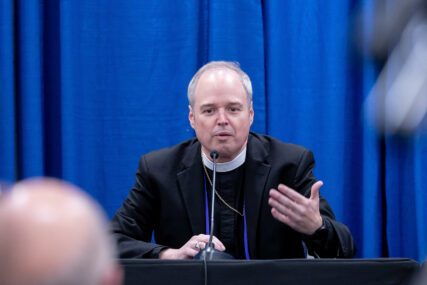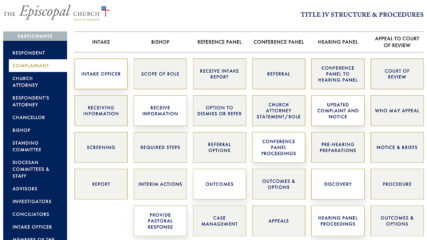The Episcopal Church revises clergy misconduct protocols for fairness, transparency

(RNS) — As it elected Bishop Sean Rowe its new presiding bishop at last week’s General Convention in Louisville, Kentucky, the Episcopal Church adopted more than 20 resolutions related to Title IV, a section of the church bylaws that governs its response to allegations against clergy of abuse or misconduct.
Over the past year, a spate of public Title IV cases prompted concerns about the complexity and effectiveness of the denomination’s approach to clergy discipline, particularly in cases involving bishops’ decisions or misconduct of their own. Less than two weeks before General Convention, the denomination disclosed that three of the five presiding bishop nominees had faced current or prior Title IV complaints. (Rowe was one of the two nominees not listed in the disclosure.)
“There’s been a lot of activity and action of distrust by the wider church, in the way Title IV has been adjudicated with bishops,” said Bishop Ian T. Douglas, retired bishop of Connecticut. He added that some bishops, on the other hand, are concerned that they might be unfairly targeted. “I think, and I hope and I pray that these changes can help rebuild trust in the system,” he said.
Some hope that the election of Rowe, who has procedural expertise and a history of bringing abuse to light as bishop of Northwestern Pennsylvania and Western New York, signals a broader shift toward a more streamlined, consistent application of Title IV.
Douglas, for one, noted that Rowe is an expert on the church’s bylaws and has years of experience chairing committees that make recommendations on Title IV. In 2010, Rowe revealed that sexual abuse allegations had been made against his deceased predecessor in Northwestern Pennsylvania, and in 2018 he published an op-ed in The Christian Century about covering up abuse in the church.
“Protecting the church, its reputation, and the vocations of clergy can no longer be more important than developing accessible, transparent procedures through which clergy and bishops are held accountable,” wrote Rowe, who, as presiding bishop, will play a key role in Title IV cases involving bishops.

Presiding Bishop-elect Sean Rowe speaks after his election during the Episcopal Church General Convention in Louisville, Ky., June 26, 2024. (Photo by Randall Gornowich)
While the changes to Title IV are by no means an overhaul, the technical adjustments, most of which will go into effect in January, are designed to improve fairness of the process for everyone involved, according to Christopher Hayes, a lawyer who chaired the Standing Commission on Structure, Governance, Constitution and Canons, which proposed resolutions on Title IV.
Some of the changes address Title IV’s discipline of bishops, which some in the wider church say has been too lenient. Last week’s General Convention voted to more closely align the Title IV process for bishops with that of other clergy, in particular extending to bishops a provision that ends their “pastoral relationship” with their dioceses by default if they are suspended for misconduct for longer than six months.
A separate resolution adjusts the composition of the board that hears complaints against bishops so that it has a slight minority, rather than a majority, of bishops.
“This rebalancing isn’t really because there is, in fact, an observed inequity, but there is a perceived inequity. And it’s that we are trying to respond to. We need to have a process that people believe is fair and careful,” Bishop Nicholas Knisely of Rhode Island, who chairs the disciplinary board for bishops, told Religion News Service. Knisely and Hayes served together on the Title IV Disciplinary Canons Committee.

The Episcopal Church General Convention meets in Louisville, Ky., June 23, 2024. (Photo by Randall Gornowich)
The new resolutions also ensure each diocese has at least one intake officer — the first point of contact for those submitting complaints of abuse or harassment — who isn’t employed by the diocese and therefore isn’t under the auspices of the bishop. Intake officers will also be required to provide monthly updates to complainants and respondents. These reports, according to Nathan Brown, a lay representative who also served on the Title IV Disciplinary Canons Committee, could be one of the most impactful changes.
“By having monthly reports required and ensuring people are kept up to date on what’s going on, particularly early in process, and having that communication, I think that will provide much greater trust in the system and much greater transparency,” Brown told RNS.
Several changes tighten the timeline of Title IV, creating 45-day windows for different phases and requiring that the entire process, “absent extraordinary circumstances,” be completed within 15 months. Other resolutions clarify the scope of the intake officers’ inquiry and limit the discretion of the church attorney, who can no longer unilaterally determine that a Title IV process should not go forward. A resolution about mechanisms for responding to lay leaders’ misconduct was referred to the Standing Commission on Structure, Governance, Constitution and Canons, as was a proposal that requested the formation of a task force that would offer major revisions to Title IV.
New language also indicates that a pastoral response is a legitimate outcome of the Title IV process, rather than a nonresponse.
“I do like the language change,” said Douglas, who said a pastoral response can include everything from psychological evaluations to coaching and enforced sabbaticals. “Of the five choices of a reference panel, the choice ‘no other action except appropriate pastoral response’ kind of sounded like it was dropped, that there would not be care and concern. … But really, pastoral response was often very substantial.”

The Episcopal Church’s Title IV website with a chart outlining Title IV participants, roles, panels and more. (Screen grab/TitleIV.org)
Some who have reported allegations against Episcopal clergy say piecemeal changes to Title IV are unsatisfactory.
Since going public last June with allegations of physical and emotional abuse against their father, Bishop Prince Singh, who has since resigned, Nivedhan and Eklan Singh, along with their mother, Roja Suganthy-Singh, have criticized the Title IV process. They say church officials failed to launch Title IV protocols in response to their allegations, then delayed providing pastoral care and were insensitive to their trauma in interviews. They also alleged that those assigned to their case had conflicts of interest.
Nivedhan Singh and Roja Suganthy-Singh told RNS that, while the updates to Title IV tackle some of their concerns about promptness and transparency, larger changes are needed.
“In our experience, (Title IV) obfuscates, confuses, ignores, mishandles, retraumatizes, and berates, all under the guise of ‘reconciliation’ with those it harms,” Nivedhan Singh wrote in an email. “Justice for us and others in similar situations requires a commitment to deep, structural reform and a willingness to hold all members of the clergy accountable, regardless of their position.”
Nivedhan Singh and Suganthy-Singh called for sweeping reforms, including mandatory Title IV training for all clergy and church leaders, educational programs on Title IV for people at all levels of the church, clear and consistent consequences for clergy found guilty of misconduct, third-party investigators and immediate pastoral care for those who file complaints.
Other observers, such as the Young Adult Caucus of General Convention, which in September published a statement citing “grave concerns” about Title IV, told RNS they were pleased with the changes made and glad to see many of their proposals become Acts of the Convention.
“We look forward to seeing further progress on the question of a church-wide Title IV intake officer, and ensuring that Bishops and all those involved in the Title IV process are better trained on their Canonical responsibilities,” the group wrote in a statement to RNS. “We haven’t fixed Title IV at GC81, but we have taken significant steps forward to creating a better system, and we look forward to working closely with Deputies and Bishops to continue this work during the Triennium and beyond.”
You Might Also Like
New book calls for authentic engagement and equity in organizations
The Nine Asks by Kimberly Danielle Organizations have a responsibility to ensure that people who come there to work, worship,...
‘Holy Hurt’ is Hillary McBride’s field guide to the shattering impact of spiritual trauma
(RNS) — Trauma is a lot like having a shard of glass in your hand, explains clinical psychologist Hillary McBride....
So You Married a Priest? + Beth Allison Barr
It’s ministry by marriage. Did you know there are piles of guidebooks meant to help women excel at...
Abyssinian Baptist Church welcomes dismissal of pastor candidate’s discrimination suit
(RNS) — A federal judge has dismissed a gender discrimination lawsuit brought against Abyssinian Baptist Church by a onetime candidate...









